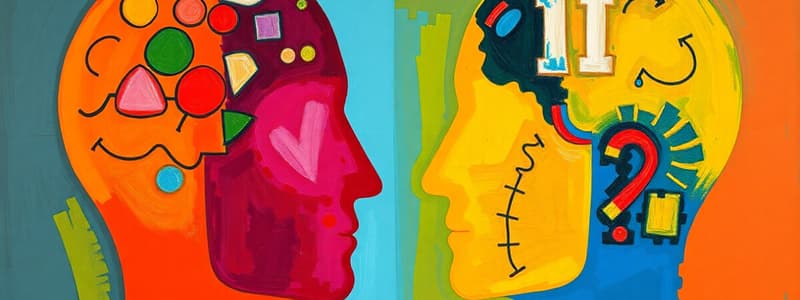Podcast
Questions and Answers
What bias involves analyzing information primarily through the lens of previously held beliefs or decisions?
What bias involves analyzing information primarily through the lens of previously held beliefs or decisions?
- Confirmation Bias (correct)
- Framing Bias
- Hindsight Bias
- Self-Serving Bias
Which decision-making error reflects the tendency to create meaning from random, unrelated events?
Which decision-making error reflects the tendency to create meaning from random, unrelated events?
- Anchoring Effect
- Overconfidence Bias
- Availability Bias
- Randomness Bias (correct)
Choosing options that provide immediate satisfaction at the expense of long-term benefits is indicative of which bias?
Choosing options that provide immediate satisfaction at the expense of long-term benefits is indicative of which bias?
- Representation Bias
- Sunk Costs Error
- Immediate Gratification Bias (correct)
- Selective Perception Bias
Which of the following illustrates a tendency to fixate on initial information while disregarding any subsequent information?
Which of the following illustrates a tendency to fixate on initial information while disregarding any subsequent information?
Which bias involves misjudging the predictability of an event after its outcome becomes known?
Which bias involves misjudging the predictability of an event after its outcome becomes known?
Which bias describes the tendency to focus primarily on the most recent experiences when making a decision?
Which bias describes the tendency to focus primarily on the most recent experiences when making a decision?
What term refers to the error of making decisions based on past investments rather than future outcomes?
What term refers to the error of making decisions based on past investments rather than future outcomes?
Which bias involves creating an overly positive self-assessment of one's abilities or performance?
Which bias involves creating an overly positive self-assessment of one's abilities or performance?
Which cognitive bias results in individuals only noticing information that supports their previous decisions while ignoring opposing data?
Which cognitive bias results in individuals only noticing information that supports their previous decisions while ignoring opposing data?
What bias is characterized by the tendency to make decisions based on initial pieces of information that are then not adjusted despite new data?
What bias is characterized by the tendency to make decisions based on initial pieces of information that are then not adjusted despite new data?
Flashcards
Heuristics
Heuristics
Using simple rules of thumb to make decisions quickly, but may lead to inaccurate judgments.
Overconfidence Bias
Overconfidence Bias
Overly confident in one's abilities and judgments, ignoring potential risks.
Immediate Gratification Bias
Immediate Gratification Bias
Preferring immediate rewards even if it means missing out on bigger rewards later.
Anchoring Effect
Anchoring Effect
Signup and view all the flashcards
Selective Perception Bias
Selective Perception Bias
Signup and view all the flashcards
Confirmation Bias
Confirmation Bias
Signup and view all the flashcards
Sunk Costs Error
Sunk Costs Error
Signup and view all the flashcards
Self-Serving Bias
Self-Serving Bias
Signup and view all the flashcards
Hindsight Bias
Hindsight Bias
Signup and view all the flashcards
Study Notes
Decision-Making Errors and Biases
-
Heuristics: Decision-making shortcuts, "rules of thumb," used to simplify complex choices.
-
Overconfidence Bias: Unrealistically positive views about oneself and one's abilities.
-
Immediate Gratification Bias: Prioritizing immediate rewards over long-term benefits or avoiding immediate costs.
-
Anchoring Effect: Over-reliance on initial information, leading to a failure to consider subsequent data, fixating on initial information and ignoring subsequent information.
-
Selective Perception Bias: Interpreting information based on preconceived notions rather than objective facts, selecting, organizing, and interpreting events based on the decision maker’s biased perceptions.
-
Confirmation Bias: Seeking information supporting existing views and ignoring contradictory evidence.
-
Framing Bias: Focusing on specific aspects of a situation while overlooking others, based on how it's presented, selecting and highlighting certain aspects of a situation while ignoring other aspects.
-
Availability Bias: Judging the likelihood of events based on how easily they come to mind, often recent events, losing decision-making objectivity by focusing on the most recent events.
-
Representativeness Bias: Assuming similarities between situations when none exist, drawing analogies and seeing identical situations when none exist.
-
Randomness Bias: Creating patterns and meaning in random events.
-
Sunk Costs Error: Continuing a course of action due to past investments, regardless of future prospects, forgetting that current actions cannot influence past events and relate only to future consequences.
-
Self-Serving Bias: Attributing success to internal factors and failure to external factors, taking quick credit for successes and blaming outside factors for failures.
-
Hindsight Bias: Overestimating the predictability of past events, after the outcome is known, mistakenly believing that an event could have been predicted once the actual outcome is known (after-the-fact).
Studying That Suits You
Use AI to generate personalized quizzes and flashcards to suit your learning preferences.




